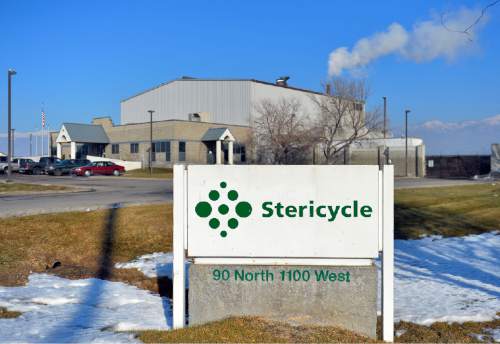This is an archived article that was published on sltrib.com in 2016, and information in the article may be outdated. It is provided only for personal research purposes and may not be reprinted.
Stericycle should be allowed to build and run two medical waste incinerators in Tooele County that can process up to 18,000 tons of hazardous medical waste per year — with technology in place to shut down operations if emissions of certain pollutants spike, state air quality officials said Thursday.
The company is currently permitted to process 2,500 pounds of waste per hour at its site in North Salt Lake, where its location near an expanding neighborhood has sparked health concerns.
While the proposed expansion will increase Stericycle's total annual emissions, improved technologies and new federal regulations will reduce the amount of certain hazardous emissions, such as lead, from the facility, officials said.
With the Utah Division of Air Quality's review complete, the agency is recommending approval of its proposed Tooele County air-quality permit for Stericycle. The permit limits how much of each pollutant can be released and establishes requirements for monitoring and controlling emissions. Each incinerator will be capable of processing 2,050 pounds of waste per hour of operation.
A 30-day public comment period on the proposed permit is now open. Comments may be emailed to jlblack@utah.gov or mailed to the Division of Air Quality, 195 North 1950 West, Salt Lake City, Utah 84114. Comments must be received by April 23, 2016, to be considered in the division's final decision.
The division also will host a public hearing at 5:30 p.m. on April 18, 2016, in the auditorium at Tooele High School, 301 W. Vine Street, Tooele.
The proposed Tooele County plant will be located in the same airshed as Stericycle's incinerator in North Salt Lake, but the move will benefit the state's overall air quality, said Bryce Bird, director of the DAQ, The new location will get the facility away from residential areas, and the new permit will require Stericycle to install continuous-emissions-monitoring systems for certain pollutants, including nitrogen oxide, he said. The required equipment will automatically shut down an incinerator's feed if the monitors detect an overage, according to DAQ documents.
Stericycle has been fined for past emissions of pollution that exceeded its current permit, and in negotiations with the state, promised to relocate to Tooele County by 2017. The continual monitoring, which DAQ is requiring in addition to federal regulations, was not directly related to that history, Bird said.
The company plans to approach the project in phases, and most likely it will not build both proposed incinerators at the same time, said Selin Hoboy, Stericycle's vice president of regulatory affairs. It will issue its response to the state's proposed requirements during the public comment period, she said.
But environmental groups said they were still concerned by the risks posed by the possible expansion of Stericycle's operations in Utah.
"It's probably shortsighted, given the projected growth" in Tooele County, said Ashley Soltysiak, a senior policy associate with HEAL Utah.
Soltysiak said she would have expected greater scrutiny from state regulators, and she said HEAL will follow the permit's progress closely.
Tim Wagner, executive director of Utah Physicians for a Healthy Environment, called the proposed expansion a "major red flag." He also took issue with the amount of emissions the DAQ proposes to permit, including 47,317 tons of carbon dioxide per year.
The permit caps emissions of small particulate matter, the pollutant category where the Wasatch Front violates Environmental Protection Agency standards, at 1.94 tons per year. It caps emissions of hazardous air pollutants, including especially toxic materials such as lead and arsenic, at 2.08 tons per year.
"Utah Physicians for a Healthy Environment has always been grateful that Stericycle is being forced to move out of their present location," Wagner said in an email. "However, we still stand by our original position that, considering this company's egregious violation record, they should have been shuttered and never allowed under any circumstances to reopen anywhere in the state."
Building the new facility also would require a solid-waste permit, which the state still has under consideration.
The division issued a notice of violation to Stericycle in 2013 when it was discovered that the company had exceeded its permitted limits for emissions of several pollutants, including nitrogen oxide. The company also was cited for its failure to report all instances of these overages, and for failure to maintain normal operating conditions during a subsequent stack test.
The company was fined $2.3 million — the largest such penalty in state history — but the fine was reduced to $1.15 million in exchange for its commitment to move.
Twitter: @EmaPen —
Gathering public input
Comments on a proposed Tooele County air quality permit for Stericycle may be emailed to jlblack@utah.gov or mailed to the Division of Air Quality, 195 N. 1950 West, Salt Lake City, Utah 84114. Comments must be received on or before April 23.
The division will host a public hearing at 5:30 p.m. on April 18 in the auditorium at Tooele High School, 301 W. Vine St., Tooele.



